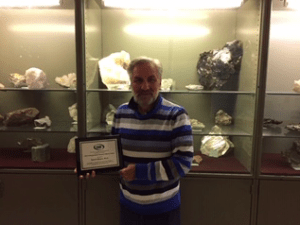Chris Canavan Contributing Writer
Dr. David Gibson, a UMF professor since 1996, has been awarded the 2019 Undergraduate Research Mentor Award by the Geosciences Division of the Council on Undergraduate Research (CUR).
This national award “recognizes the critical work of a geoscience faculty member who serves as a role model for productive and transformative student-faculty mentoring relationships,” according to a UMF press release regarding the accomplishment. Gibson received his award at the National Geological Society of America Conference held in Phoenix, Arizona.
Gibson says that he had been interested in providing students with opportunities to conduct field research since he first started at UMF. In fact, he was specifically asked by students at his job interview if he would take them out to conduct field research. “Someone can look at pretty textbooks all day long [but] on- the-ground observation is really key,” says Gibson.
He said that students usually come to him with something they are interested in researching or want to learn more about. From that point of interest, Gibson will mentor the students and assist them in their research. “It is much easier for students to learn if they are having fun.”
“Doing research projects is really important,” said Gibson. “It takes what you learn in the classroom and in [the] lab and puts it in context.”
Gibson was nominated by students and professionals for this prestigious award. In the press release, Gibson was quoted saying, “Research in the field is one of the essential tools of the trade and something students are eager to be involved in.”
Gibson teaches courses such as Mineralogy and Petrology to students who major in geology. He also teaches a course titled The Dynamic Earth, an introductory course for non-geology majors. In addition to his duties as a professor, Dr. Gibson has led May term travel courses including trips to Ireland and Scotland.
Gibson earned a Bachelor of Science Degree and a PhD from The Queen’s University of Belfast. Gibson taught in Canada for seven years before he came to the U.S. as a research assistant in 1984. He said his interest in geology started in high school and that he has always been lucky to live in places where there are a “diverse range of rocks in a short distance.”
